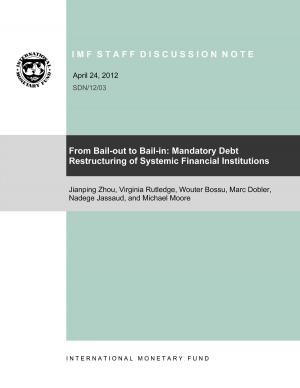Promoting Fiscal Discipline
Business & Finance, Economics, Public Finance, Finance & Investing, Banks & Banking, Macroeconomics| Author: | Manmohan Mr. Kumar, Teresa Mrs. Ter-Minassian | ISBN: | 9781452729152 |
| Publisher: | INTERNATIONAL MONETARY FUND | Publication: | October 18, 2007 |
| Imprint: | INTERNATIONAL MONETARY FUND | Language: | English |
| Author: | Manmohan Mr. Kumar, Teresa Mrs. Ter-Minassian |
| ISBN: | 9781452729152 |
| Publisher: | INTERNATIONAL MONETARY FUND |
| Publication: | October 18, 2007 |
| Imprint: | INTERNATIONAL MONETARY FUND |
| Language: | English |
Fiscal discipline is essential to improve and sustain economic performance, maintain macroeconomic stability, and reduce vulnerabilities. Discipline is especially important if countries, industrial as well as developing, are to successfully meet the challenges, and reap the benefits, of economic and financial globalization. Lack of fiscal discipline generally stems from the injudicious use of policy discretion. The benefits of discretion are seen in terms of the ability of policymakers to respond to unexpected shocks and in allowing elected political representatives to fulfill their mandates. But discretion can be misused, resulting in persistent deficits and procyclical policies, rising debt levels, and, over time, a loss in policy credibility. The authors first explore the role of discretion in fiscal policy, and the extent, consequences, and causes of procyclicality, particularly in good times. They then examine how a variety of institutional approaches—fiscal rules, fiscal responsibility laws, and fiscal agencies—can help improve fiscal discipline. While each of these approaches can play a useful role, the authors suggest that a strategy combining them is likely to be particularly beneficial. Although such a strategy requires political commitment and effective fiscal management, at the same time, the strategy itself can bolster political commitment by highlighting the restraints on government and raising the costs of failing to respect them.
Fiscal discipline is essential to improve and sustain economic performance, maintain macroeconomic stability, and reduce vulnerabilities. Discipline is especially important if countries, industrial as well as developing, are to successfully meet the challenges, and reap the benefits, of economic and financial globalization. Lack of fiscal discipline generally stems from the injudicious use of policy discretion. The benefits of discretion are seen in terms of the ability of policymakers to respond to unexpected shocks and in allowing elected political representatives to fulfill their mandates. But discretion can be misused, resulting in persistent deficits and procyclical policies, rising debt levels, and, over time, a loss in policy credibility. The authors first explore the role of discretion in fiscal policy, and the extent, consequences, and causes of procyclicality, particularly in good times. They then examine how a variety of institutional approaches—fiscal rules, fiscal responsibility laws, and fiscal agencies—can help improve fiscal discipline. While each of these approaches can play a useful role, the authors suggest that a strategy combining them is likely to be particularly beneficial. Although such a strategy requires political commitment and effective fiscal management, at the same time, the strategy itself can bolster political commitment by highlighting the restraints on government and raising the costs of failing to respect them.















